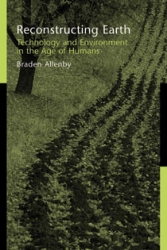
Braden Allenby
Braden R. Allenby is a Professor of the Ira A. Fulton School of Engineering at Arizona State University. Until 2004, he was the Environment, Health and Safety Vice President for AT&T. He has been a Batten Fellow in Residence at the University of Virginia's Darden Graduate School of Business Administration and an adjunct professor at Columbia University's School of International and Public Affairs.
From 1995 to 1997, he was Director for Energy and Environmental Systems at Lawrence Livermore National Laboratory, on temporary assignment from his position as Research Vice President, Technology and Environment, for AT&T.
He graduated cum laude from Yale University in 1972, received his Juris Doctor from the University of Virginia Law School in 1978, his Masters in Economics from the University of Virginia in 1979, his Masters in Environmental Sciences from Rutgers University in the Spring of 1989, and his Ph.D. in Environmental Sciences from Rutgers in 1992.
Dr. Allenby is a member of the Virginia Bar, and has worked as an attorney for the Civil Aeronautics Board and the Federal Communications Commission, as well as a strategic consultant on economic and technical telecommunications issues.
He joined AT&T in 1983 as a telecommunications regulatory attorney, and was an environmental attorney and Senior Environmental Attorney for AT&T from 1984 to 1993. During 1992, he was the J. Herbert Holloman Fellow at the National Academy of Engineering in Washington, DC. He is currently a member of the Environmental Law Institute Board of Directors; a member of the Advisory Board of the University of Michigan Corporate Environmental Management Program; a member of the Advisory Committee of the UNEP Working Group on Product Design for Sustainability; a member of the Scientific Advisory Board of the DoE/DoD/EPA Strategic Environmental Research and Development Program; a Trustee of the National Environmental Education and Training Foundation; a member of the editorial boards of The Journal of Industrial Ecology, Environmental Science and Technology, the Environmental Law Institute Forum, The Journal of Sustainable Product Design, The Bulletin of Science, Technology and Society, and Environmental Quality Management; and a former member of the Secretary of Energy's Advisory Board and the DOE Task Force on Alternative Futures for the DOE National Laboratories. In June, 2000, he chaired the second Gordon Conference on Industrial Ecology.
Dr. Allenby has authored a number of articles and book chapters on industrial ecology and Design for Environment; writes a column for the Journal of Industrial Ecology; is co-editor of The Greening of Industrial Ecosystems, published by the National Academy Press in 1994, and of Environmental Threats and National Security: An International Challenge to Science and Technology, published by Lawrence Livermore National Laboratory; and is co-author or author of several engineering textbooks, including Industrial Ecology, published by Prentice-Hall in January of 1995, Design for Environment published by Prentice-Hall in 1996, Industrial Ecology and the Automobile, published by Prentice-Hall in 1997, and Industrial Ecology: Policy Framework and Implementation, published by Prentice-Hall in 1998.
He has taught courses on industrial ecology and Design for Environment at the Yale University School of Forestry and Environmental Studies and at the University of Wisconsin Engineering Extension School; and has lectured widely on earth systems engineering and management, industrial ecology, and Design for Environment.
He is a Fellow of the Royal Society for the Arts, Manufactures & Commerce.

